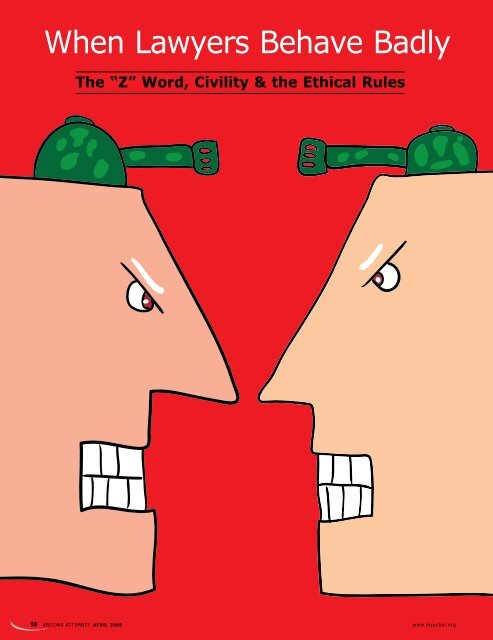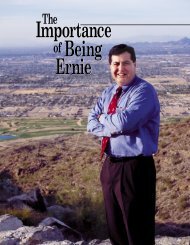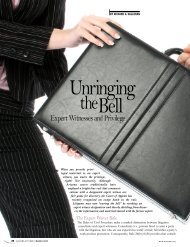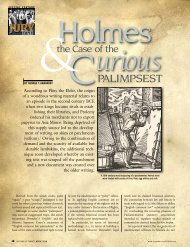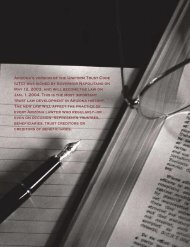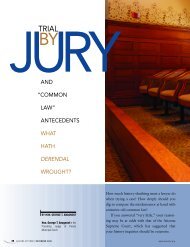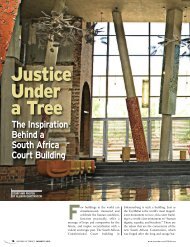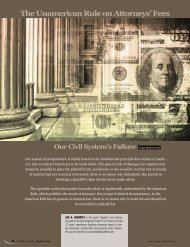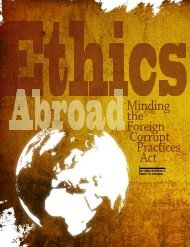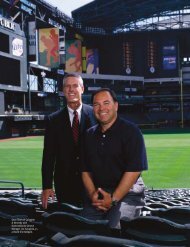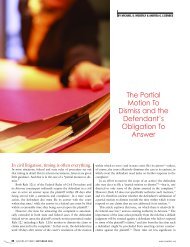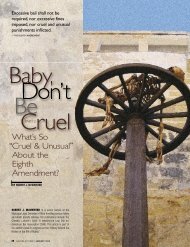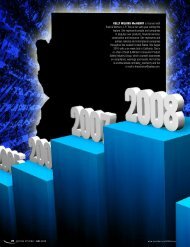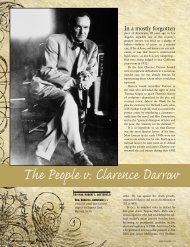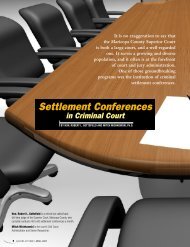When Lawyers Behave Badly
When Lawyers Behave Badly
When Lawyers Behave Badly
You also want an ePaper? Increase the reach of your titles
YUMPU automatically turns print PDFs into web optimized ePapers that Google loves.
<strong>When</strong> <strong>Lawyers</strong> <strong>Behave</strong> <strong>Badly</strong><br />
The “Z” Word, Civility & the Ethical Rules<br />
18 A R I Z O N A AT T O R N E Y A P R I L 2 0 0 8<br />
w w w. m y a z b a r. o r g
BY DAVID D. DODGE<br />
Several<br />
years<br />
ago,<br />
when the Arizona Supreme<br />
Court adopted our new Rules of<br />
Professional Conduct, 1 one of the most<br />
important changes from the prior rules got<br />
almost no notice at all in Arizona: The<br />
word “zealous” was eliminated from every<br />
sentence in the rules, including the<br />
Preamble and the comments to them. With<br />
these changes, Arizona became the first<br />
state to abandon the notion of “zealous<br />
advocacy,” a step others have since followed.<br />
2 In Arizona, we now embrace the<br />
notion that lawyers “act honorably,” not<br />
“zealously,” in pursuit of their clients’<br />
interests.<br />
The elimination of the concept of “zealousness,”<br />
which has been called “The<br />
Arizona Solution,” drew quite a bit of<br />
attention nationally, and it stands as a leading<br />
example of one state’s reaction to the<br />
perception that zealous advocacy long ago<br />
stopped being an ethical responsibility and<br />
had become instead a pretext for bullying,<br />
rude and sometimes frightening behavior. 3<br />
As one commentator put it so articulately:<br />
Zealous advocacy is the buzz word<br />
which is squeezing decency and civility<br />
out of the law profession. … [It is] the<br />
modern day plague which infects and<br />
weakens the truth-finding process and<br />
makes a mockery of the lawyer’s claim<br />
to officer of the court status. 4<br />
It’s probably not very realistic to think<br />
that we are all going to act like society hostesses<br />
in a professional world that is often so<br />
contentious and where so much is often at<br />
stake. But, in Arizona at least, lawyers will<br />
no longer be able to point to the once aspirational<br />
concept of zealous advocacy to justify<br />
what everybody else had no trouble<br />
recognizing as just plain bad manners.<br />
• If you think all of this was simple overreacting,<br />
consider the following:In one<br />
matter involving an Arizona lawyer, the<br />
lawyer called one of the treating doctors<br />
in his case a “f_ _ _ ing ass_ _ _ _”<br />
in front of the doctor’s staff and threatened<br />
to hold the doctor’s fee “in trust<br />
until he died.” He also announced to<br />
all present in the lobby of the Glendale<br />
Justice Court that some of the<br />
non-lawyer pro tem justices of the<br />
peace there were “f_ _ _ ing lousy,”<br />
called opposing counsel a “liar” during<br />
a pretrial conference and later told a<br />
Superior Court Judge that his ruling of<br />
a claim of attorney–client privilege was<br />
“crazy.” The lawyer followed up on this<br />
remark by calling the judge names until<br />
he was cited for contempt. In addition,<br />
during an earlier deposition, the lawyer<br />
told opposing counsel to “go perform<br />
an unnatural sex act on himself.” The<br />
lawyer’s defense to all of this That he<br />
was zealously protecting his clients in<br />
accordance with duties described in the<br />
Preamble to the Rules of Professional<br />
Conduct then in effect. The<br />
Disciplinary Commission did not agree,<br />
and censured the lawyer. 5<br />
• In another case, the lawyer called<br />
opposing counsel, including an<br />
Assistant United States Attorney, a<br />
“stooge,” a “puppet,” a “deadhead”<br />
who “had been mentally dead for 10<br />
years” and “an underling who graduated<br />
from a 29th tier law school.” <strong>When</strong><br />
a U.S. Bankruptcy Court imposed a<br />
$25,000 sanction against the lawyer, he<br />
appealed, arguing that his conduct,<br />
while offensive, helped him recover<br />
more money for his clients and served<br />
him well in settlement negotiations and<br />
was therefore appropriate. The Fifth<br />
Circuit found the lawyer’s behavior to<br />
be “egregious, obnoxious and insulting”<br />
and affirmed the sanction. 6<br />
• Even legal luminaries such as Joseph<br />
Jamail of the Texas Bar fall victim to<br />
the sins of zealousness and bad behavior.<br />
During a deposition taken in a<br />
Delaware case contesting the terms of a<br />
corporate merger in which Mr. Jamail<br />
had not yet been admitted pro hac vice<br />
David D. Dodge is a partner in the<br />
Phoenix law firm Dodge, Anderson, Mableson,<br />
Steiner, Jones & Horowitz, Ltd. He is a former<br />
Chair of the Disciplinary Commission of the<br />
Arizona Supreme Court.<br />
but was participating anyway, Mr.<br />
Jamail objected to the form of a question<br />
in the following unfortunate fashion:<br />
“Don’t ‘Joe’ me, ass_ _ _ _. You<br />
can ask some questions, but get off<br />
that. I’m tired of you. You could gag a<br />
maggot off a meat wagon.”<br />
The court found Mr. Jamail’s behavior<br />
“outrageous and unacceptable” and gave<br />
him 30 days to explain his actions and to<br />
show cause why his conduct should not be<br />
considered as a bar to his participating any<br />
further in the proceeding. 7<br />
An article in The Professional Lawyer 8<br />
details other instances of atrocious lawyering,<br />
presumably the direct or indirect result<br />
of zealous representation. It is hard to read<br />
the stories set forth there without having<br />
your jaw occasionally hit the top of your<br />
desk.<br />
And if that article does not bother you,<br />
just read the litany of examples set forth in<br />
the proposed Comment to new Rule 41<br />
when it was being considered by the<br />
Arizona Supreme Court. 9 Suffice it to say<br />
that there are a number of lawyers who<br />
have demonstrated that they should not be<br />
practicing law but who continue to hold<br />
licenses because “over-zealousness” usually<br />
only draws a censure or at most a short suspension<br />
from the disciplinary authorities.<br />
Background of the<br />
Problem<br />
The concept of zealous advocacy first<br />
found its way into legal ethics via Canon 7,<br />
found in the Code of Professional<br />
Responsibility. It stated that “a lawyer shall<br />
represent a client zealously within the<br />
bounds of the law.” 10<br />
The Code has not been in effect in<br />
Arizona since 1985, when the Arizona<br />
Supreme Court adopted the ABA’s Model<br />
Rules of Professional Conduct. ER 1.3 of<br />
the Model Rules, the provision that<br />
replaced Canon 7, intentionally dropped<br />
w w w. m y a z b a r. o r g<br />
A P R I L 2 0 0 8<br />
A R I Z O N A AT T O R N E Y 19
The “Z” Word, Civility & the Ethical Rules<br />
the “zealous” requirement, stating only that<br />
“a lawyer shall act with reasonable diligence<br />
and promptness in representing a client.”<br />
The problem with the then-new ER 1.3 was<br />
that the Preamble to the Rules of<br />
Professional Conduct and the Comment to<br />
ER 1.3 both retained and tacitly embraced<br />
the concept of zealous behavior. Known as<br />
the “Zealous Advocacy Loophole,” the<br />
zealous behavior references in the Preamble<br />
and the ER 1.3 comments still seemed to<br />
condone some really bad behavior. Even the<br />
heralded revisions of the most recent Model<br />
Rules developed by the ABA’s Ethics 2000<br />
Commission didn’t resolve the problem.<br />
Although the comments and new ER<br />
1.3 dropped reference to zealous representation,<br />
the Preamble left them alive and<br />
well. It was in this context that the Arizona<br />
Supreme Court, when it adopted the ABA<br />
Model Rules, put its own “brand” on<br />
them, one of which was to eliminate the<br />
“Z” word everywhere, and to make sure<br />
Arizona’s lawyers knew why such action<br />
was taken.<br />
More Help on the Way<br />
Have we run out of weapons against offensive<br />
personality Hardly.<br />
The Arizona Supreme Court recently<br />
amended Rules 31(a)(2), 41 and 53 of the<br />
Arizona Supreme Court, effective Jan. 1,<br />
2008, to make it very clear that boorish<br />
behavior is now regarded as potentially violating<br />
one or more specific ethical rules,<br />
with attendant disciplinary consequences. 11<br />
Rules 31, 41 and 53 probably do not<br />
get read very much by most practicing<br />
lawyers.<br />
Rule 31(a)(2) contains certain definitions<br />
to be used in the Supreme Court rules<br />
that regulate the practice of law in Arizona.<br />
The new rules add a definition for “unprofessional<br />
conduct” at subpart E of<br />
Rule 31(a)(2) to include substantial or<br />
repeated violations of the Oath of<br />
Admission to the Bar or the Lawyer’s<br />
Creed of Professionalism of the State Bar of<br />
Arizona.<br />
Remember the oath of admission In<br />
case you forgot to commit it to memory,<br />
look at page 7 of your current Membership<br />
Directory. It sets forth a number of broad<br />
aspirational objectives, but it also includes a<br />
promise to “at all times faithfully and diligently<br />
adhere to the rules of professional<br />
responsibility and a lawyer’s creed of professionalism<br />
of the State Bar of Arizona.” 12<br />
The Lawyer’s Creed is found at pages 6 and<br />
7 of your current Membership Directory, 13<br />
and sets forth some very specific non-aspirational<br />
commands. If you have not read<br />
the Creed recently, you might refresh your<br />
recollection of it. Violations of it might well<br />
soon get you an invitation into Arizona’s<br />
disciplinary system.<br />
Rule 41 sets forth the duties and obligations<br />
of members of the Arizona bar,<br />
including those prescribed in Rule 42,<br />
which is where Arizona’s Rules of<br />
Professional Conduct are found. Rule 41(g)<br />
used to require members “to abstain from<br />
all offensive personality and to advance no<br />
fact prejudicial to the honor or reputation of<br />
a party or a witness unless required by the<br />
justice of the cause with which he is<br />
charged.” The new rule requires members<br />
“to avoid engaging in unprofessional conduct”<br />
rather than (and in place of) “to<br />
abstain from all offensive personality.”<br />
Remember that the new Rule 31(a)(3)E<br />
would define “unprofessional conduct” to<br />
include violations of the oath of admission<br />
to the bar and the Lawyer’s Creed. Rule 53<br />
has also been amended to add a new<br />
Rule 53(j), making it a disciplinary offense<br />
to engage in “unprofessional conduct” as<br />
defined in new Rule 31(a)(2)(E).<br />
Together, the amendments clarify what<br />
most of us have always known in the first<br />
place: That offensive and abusive lawyers<br />
are engaging in “unprofessional conduct.”<br />
Now, instead of arguing that such conduct<br />
violates, depending on the circumstances,<br />
ERs 3.4 (Fairness to Opposing Party and<br />
Counsel), 4.4 (Respect to Rights of Third<br />
Persons) and 8.4(d) (Misconduct, specifically<br />
engaging in conduct that is prejudicial<br />
to the administration of justice), the State<br />
Bar will be able to point specifically to<br />
Arizona Supreme Court Rules 41 and 53<br />
and seek discipline as a result.<br />
Rules Are Not Enough<br />
All of these new rules won’t change the<br />
habits of the true sociopaths among us, but<br />
they should give those lawyers tempted to<br />
misbehave occasionally a reason to consider<br />
other options.<br />
None of the Supreme Court’s new rules<br />
is going to be truly effective unless the judiciary<br />
embraces them and reports lawyers to<br />
the State Bar and sanctions them under<br />
court rules. And none of the State Bar’s<br />
efforts is going to be truly effective unless<br />
lawyers start reporting the obvious violations.<br />
There is a natural reluctance to<br />
report a fellow lawyer, especially for an isolated<br />
instance of unprofessional behavior.<br />
But when bad behavior becomes a habit,<br />
even in the stressful situations in which we<br />
often find ourselves as lawyers, do not<br />
expect a resolution of the problem unless<br />
you become a part of the cure.<br />
AZ<br />
AT<br />
endnotes<br />
1. Rule 42, ARIZ.R.S.CT.<br />
2. Indiana, Louisiana, Montana,<br />
Nevada, New Jersey, Oregon<br />
and Washington have omitted<br />
all reference to zealousness<br />
in their rules, preambles and<br />
commentary.<br />
3. Allen K. Harris, Increasing<br />
Ethics, Professionalism and<br />
Civility: Key to Preserving the<br />
American Common Law and<br />
Adversarial System, PROF. LAW.<br />
(2005 Symposium Issue), at<br />
page 109.<br />
4. Kathleen P. Browe, Comment,<br />
A Critique of the Civility<br />
Movement: Why Rambo Will<br />
Not Go Away, 77 MARQ. L.<br />
REV. 751, 767 (1994).<br />
5. John T. Banta, Disciplinary<br />
Commission report, found at<br />
www.supreme.state.az.us/dc/<br />
disciplinarycommission.htm<br />
(Disciplinary Cases Matrix,<br />
2004 cases).<br />
6. In re First City Bancorporation<br />
of Texas, Inc., 282 F.3d 864 (5th<br />
Cir. 2002).<br />
7. Paramount Commc’ns, Inc. v.<br />
QVC Network Inc., 637 A.2d<br />
34, 53-54 n.29 (Del. 1994).<br />
8. Harris, supra note 3, at 200 et<br />
seq.<br />
9. See www.supreme.state.az.us/<br />
rules/prrulsct.htm, at R-05-<br />
0021.<br />
10. Model Code of Professional<br />
Responsibility, Canon 7 (1980).<br />
11. See www.supreme.state.az.us/<br />
rules/Recent_rules.htm.<br />
12. A Lawyer’s Creed of<br />
Professionalism of the State Bar of<br />
Arizona, unanimously adopted by<br />
the Board of Governors, State Bar<br />
of Arizona, on May 19, 1989.<br />
13. The Oath and the Creed also<br />
appeared recently in ARIZONA<br />
ATTORNEY. See Jim Lee & Patricia<br />
Sallen, New Professionalism and<br />
Lawyer Discipline Rule Adopted,<br />
ARIZ. ATT’Y, Dec. 2007, at 32<br />
and 34.<br />
20 A R I Z O N A AT T O R N E Y A P R I L 2 0 0 8<br />
w w w. m y a z b a r. o r g


